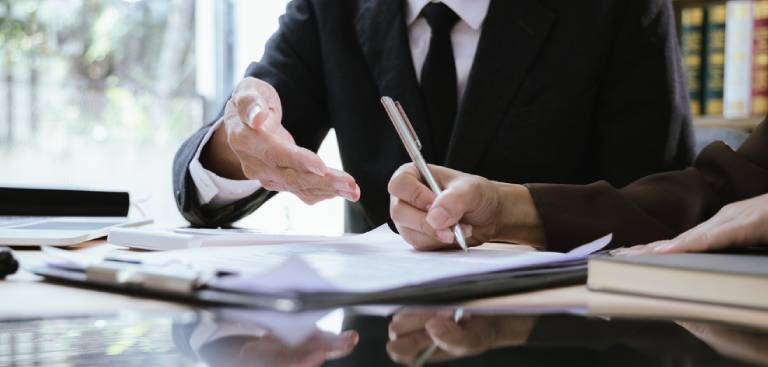What Happens After a Deposition in a Personal Injury Case?
 A deposition can be one of the most critical milestones in a personal injury case. Once it’s complete, clients are often left wondering what comes next. A deposition isn’t the end of the process but frequently shapes how the rest of the case unfolds.
A deposition can be one of the most critical milestones in a personal injury case. Once it’s complete, clients are often left wondering what comes next. A deposition isn’t the end of the process but frequently shapes how the rest of the case unfolds.
At the Law Offices of Feeley & LaRocca, we help injured clients—especially public employees—understand what each step means for their recovery and legal outcome.
What Is a Deposition and Why Does It Matter?
A deposition is a formal, recorded statement given under oath during the discovery phase of a lawsuit. Both parties—the injured person and the defendant—can be deposed. During this process, attorneys ask detailed questions, and a court reporter records the testimony.
The purpose is to gather facts, test credibility, and preserve statements for trial. For clients pursuing claims tied to long-term injuries or potential pension eligibility, such as a Winfield Park NJ firefighter pension, the deposition can highlight the full impact of the injury on daily life and career longevity.
What Happens After the Deposition?
The following steps depend on how the deposition goes and what new facts are revealed. In most cases, here’s what happens next:
-
Transcript Review and Corrections
After the deposition, a transcript is prepared. You’ll have the opportunity to review it for accuracy. This allows you to correct minor errors, such as names or dates, that may have been misrecorded.
-
Further Discovery
Additional documents or witness statements might be requested if new information comes to light during your testimony. For example, if you mention a new treating physician, opposing counsel may ask for updated medical records or schedule another deposition.
-
Medical Examinations
Sometimes, the defense will schedule an Independent Medical Examination (IME) to evaluate your condition. This is especially common if you seek long-term benefits or relief from a disability claim.
-
Settlement Discussions
Depositions often give both sides a better sense of the case’s strengths and weaknesses. As a result, negotiations may begin—or resume—shortly after the transcript is reviewed. A fair settlement may be offered without trial if the deposition went well and the evidence is clear.
-
Trial Preparation
If no agreement is reached, both sides begin preparing for trial. Your deposition may be used during the trial to challenge inconsistent statements or reinforce your credibility.
Key Decisions That May Follow a Deposition
Several pivotal decisions happen in the weeks after a deposition:
- Settlement Consideration: You may receive an offer. We’ll advise whether it reflects the full extent of your injuries and losses.
- Trial Strategy: If the case proceeds, we’ll begin building arguments based on the testimony given.
- Pension Claim Planning: If your injuries may lead to a public retirement claim, such as a state police pension, we evaluate how the deposition supports your eligibility.
We ensure that you understand how each decision affects not just your case but your long-term future. Reviewing our practice areas will help you learn more about how we assist public employees.
What You Can Do to Strengthen Your Case Post-Deposition
After the deposition, your role in the case isn’t over. There are still several ways to protect your claim:
- Keep Medical Appointments: Gaps in treatment can weaken your case.
- Follow Doctor’s Advice: If you’re told not to work or lift heavy objects, don’t ignore those restrictions.
- Avoid Public Statements: Insurance companies may monitor your activity online or in public.
- Inform Us of Changes: Let us know if your condition worsens or if you start seeing a new provider.
We remain closely involved after your deposition, especially in cases involving a public pension, where benefits are linked to both medical and administrative findings.
How the Law Offices of Feeley & LaRocca Supports You
When you work with our firm, we don’t just represent you during the deposition—we stay involved throughout every stage. Whether the next step is mediation, settlement, or trial, we’re committed to protecting your interests.
Our office also represents clients while simultaneously managing other legal processes tied to work-related injuries, such as teacher pension applications. These cases require careful coordination to ensure no benefit is left on the table. Visit our testimonials to read more about how clients describe working with us.
Ready for the Next Step?
The period after a deposition is a critical turning point. At the Law Offices of Feeley & LaRocca, we help clients understand their options and take informed action. If you’re managing a personal injury case, we’re ready to coordinate your efforts and maximize your outcome. Contact us today so our firm can guide you toward a resolution that reflects the full value of your case.
